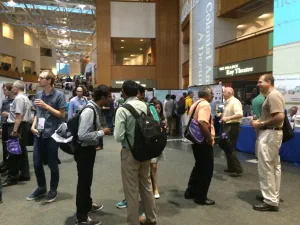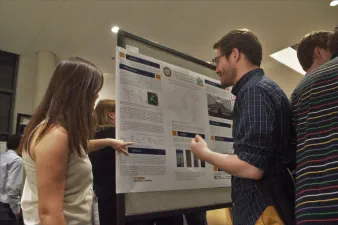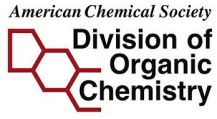Mid-Career Investigator Award - Past Awardees
The Division of Organic Chemistry’s Mid-Career Investigator (MCI) program recognizes scientists who are more than 10 years from graduate school or post-doctoral appointment and are a current researcher in a non-academic setting (e.g. industry, government or non-profit laboratory) who have demonstrated sustained excellence in Organic Chemistry. This program was initiated in 2021. It is a descendant of the Young Industrialists Symposium award program that was started in 2007 and is now called the Early Career Investigator (ECI) program. Below you will find the awardees and their talk titles from the various MCI symposia.
2024 Awardees
- Jean-Christophe Califano, AbbVie. “Development of the enabling route to the ABB-011 drug-linker”
- Sebastien Caille, Amgen. “Current and future outlook on the manufacturing of multi-modality synthetic drug substances”
- Yongda Zhang, Boehringer Ingelheim Pharmaceuticals. “Asymmetric synthesis of chiral phosphorothioate”
- Alaric Dyckman, Bristol Myers Squibb. “Optimization of antagonists of toll-like receptors 7 and 8 (TLR7/8) leading to the discovery of afimetoran”
- William Gallagher, Bristol Myers Squibb. “Adventures in the synthesis of a complex pharmaceutical candidate enabled by novel reactions”
- Gregory Beutner, Bristol Myers Squibb. “Longer or the shorter routes? A process chemistry perspective on step count”
- Jeremy Wilmot, Corteva Agriscience. “Informatics across three generations of Picolinamides”
- Joseph Pero, GSK. “Discovery of inhibitors of N-linked glycosylation and their use in elucidating the pan-antiviral potential of STT3A/B”
- Steven Goldberg, Johnson & Johnson Innovative Medicine. “Discovery of small molecule modulators of the IL-23/IL-17 pathway”
- Kristi Leonard, Johnson & Johnson Innovative Medicines. “Quinazoline-based covalent inhibitors of KRASG12C for the treatment of solid tumors”
- Phieng Siliphaivanh, Merck & Co. Inc.. “Discovery of MK-4424, a selective and highly potent RIPK1 Type III inhibitor for the treatment of neurodegenerative diseases”
- Alexey Makarov, Merck & Co., Inc. “Scientific journey: advancing analytical toolbox to enable peptide drug discovery”
- Artis Klapars, Merck & Co., Inc.. “Practical synthesis of PCSK9 inhibitor MK-0616”
- Kian Tan, Novartis. “Novartis SynTech: Accelerating drug discovery through synthesis innovation, automation, and machine learning”
- Matthew Sammons, Pfizer. “Oral Main Protease (Mpro) inhibitors for the treatment of COVID-19”
2023 Awardees
- Xue (Ida) Chen, Dow. “Highlights of Dow Amines: Solutions to Address Industrial Challenges”
- Russell Cink, AbbVie. “Process development for glecaprevir”
- Richard Fox, BMS. “Adventures in Process Chemistry: Sustainable Manufacturing of BMS-986278 Leveraging an ERED/KRED Biocatalytic Cascade”
- Scott Kuduk, Janssen. “HBV Capsid Assembly Modulators: From Oxadiazepinones to Intramolecular Ring Opening of Oxetanes”
- Angel Morales-Ramos, GSK. “Direct to biology (D2B): Pre-validation of biological assays”
- William Morris, Merck. “Influence of Enabling Technologies on Process Definition”
- Deborah Mortensen, BMS. “Cereblon Mediated Ligand Directed Degradation in Drug Discovery”
- Julien Papillon, Novartis. “Organic chemistry in small molecule drug discovery”
- Matthew Ravn, AbbVie. “Small molecule chemist’s journey to antibody drug conjugates”
- Mikhail Reibarkh, Merck. “Led-NMR spectroscopy: A practical tool for mechanistic studies of photochemical reactions”
- Jeffrey Sperry, Vertex. “Improving Pharmaceutical Process Development Using Inherently Safer Design”
- Scott Sutton, Pfizer. “Discovery of targeted therapies for cancer patients: CDK2/4/6 inhibitor Ebvaciclib and EZH2 inhibitor PF-06821497”
- Ling Tong, Merck. “Voyage into uncharted chemical space in drug discovery”
- Brandon Turunen, GSK. “Applications of Cytotoxicity Targeting Chimeras (CyTACs) to Unlock Cellular Surface Targets to Antibody Pharmacology”
- Matthew Zajac, GSK. “Selective yet Capricious: Mechanistic Studies of a 3+2 Reaction”
- Wenming Zhang, FMC. “Discovery of Indazapyroxamet: A novel 3-pyridinyl insecticide targeting piercing/sucking insects”
2022 Awardees
- Michael Ameriks, Janssen. “Identification and characterization of fused azabicyclo[3.3.1]nonanes as selective, non-covalent monoacylglycerol lipase (MAGL) inhibitors for the treatment of CNS disorders”
- Simon Berritt, Pfizer. “Program enabling strategies using HTE”
- Caroline Blakemore, Pfizer. “Driving drug discovery through synthesis”
- Laura D’Agostino, BMS. “Identification of Small Molecule Inhibitors and Heterobifunctional Degraders of Calcium/calmodulin Dependent Protein Kinase Kinase 2 (CAMKK2)”
- Spencer Dreher, Merck. “High throughput experimentation in medicinal chemistry”
- Brian Hopkins, Biogen. “The development of selective kinase inhibitors to treat autoimmune disease finding a cure for Dr. Jekyll and Mr. Hyde“
- Jeffrey Kallemeyn, AbbVie. “Application of reaction kinetics in the development of mutagenic impurity control strategies”
- Beth Knapp-Reed, GSK. “Discovery of a selective and potent lead series for GRK2 inhibition”
- Ivar McDonald, BMS. “Development of a P(V) method for stereocontrolled oligonucleotide synthesis”
- Helen Mitchell, Merck. “Leveraging capabilities and resource sparing approaches in drug discovery”
- Shashank Shekhar, AbbVie. “Highlights from the center of catalysis at Abbvie.”
- Edward Sherer, Merck. “Championing the adoption of predictive sciences into the pharmaceutical process and development space”
- Scott Wolkenberg, Janssen. “High-throughput chemistry accelerates the optimization of small molecule therapeutics, chemical biology probes, and protein degraders”
- Ming Xu, FMC. “Afoxolaner: a new isooxazoline for the control of fleas and ticks on dogs by oral administration”
- Michael Zacuto, BMS. “Preparation of α-(isoindolinone-2-yl) glutarimides: Process Development of Cereblon E3 ligase modulating drugs.”
- Haiming Zhang, Genetech. “Development of an Atroposelective Process of KRAS G12C Inhibitor GDC-6036”
2021 Awardees
- Yun Ding, GSK. “Advances in DNA-encoded library technology (ELT): From on-DNA chemistry to preclinical candidate”
- Travis Dunn, AbbVie. “Process development in the manufacture of a Reformatsky reagent from methyl 1-bromocyclopropanecarboxylate”
- Cameron Lee, Novartis. “Enabling ultra-long-acting biologics with synthetic chemistry”
- Fangzheng Li, Corteva. “Process route design of structurally complex agrochemical candidates”
- Kevin Maloney, Merck. “Scientific journey in process chemistry”
- Mehran Jalaie, Pfizer. “Lead identifications across therapeutic areas”
- Jennifer Riggs, BMS. “Cereblon-mediated molecular glues: Advances and future opportunities to target the undruggable proteome”
- Oliver Thiel, Amgen. “Molecular complexity as a driver for innovation in pharmaceutical process development”
You must be a member of the ORGN Division to access this form.
Mid-Career Investigator Award
Purpose
The purpose of the Mid-Career Investigator (MCI) Award program is to recognize scientists who are more than 10 years from graduate school or post-doctoral appointment and are a current researcher in a non-academic setting (e.g. industry, government or non-profit laboratory) who have demonstrated sustained excellence in Organic Chemistry.
History
An award program to recognize early career organic chemists working in non-academic settings was started in 2007 and it was called the Technical Achievement in Organic Chemistry (TAOC) award. In 2021, the executive committee recognized the need to recognize mid-career organic chemists working in non-academic settings. Therefore, in 2021, the program was split into the Early Career Investigator (ECI) and the Mid-Career Investigator (MCI) programs.
Selection of Awardees
Awardees are selected by the Mid-Career Investigator Awards Committee from a pool of candidates nominated by their respective employers and are approved by the Executive Committee of the Division of Organic Chemistry. Nominations are accepted through the online Mid Career Investigator Award Nomination Form. The nomination package will be used by the awards committee to select Mid Career Awardees and must include the following materials:
- A letter containing the address of the nominee, and information written on company letterhead that presents evidence that illustrates the scientist’s promise, creativity, and productivity. The letter should be a maximum of three pages and should detail the impact of the candidate with examples from their work on the portfolio with relevant schemes/publications/patents, including what opportunities and deliverables they have had as an individual contributor/step lead/project lead/etc. Any additional information that documents unique, non-project related achievements made by the nominee may also be included. We recommend focusing on 3-4 selected signature accomplishments that clearly demonstrate the scientist’s creativity and productivity. The letter should also articulate what sets this candidate apart from other EC candidates in terms of their impact to science, culture, and the chemistry community, capturing their promise in their respective department and the field of organic chemistry.
- The nominee’s CV (including work address and email) that includes a description of their educational background and experience, and publication and patent record.
- Second letters will be considered but are not necessary. The main letter can be jointly submitted by more than one nominator.
- We recognize that publication practices vary by company and as such, consider all nomination packages in their entirety. If publications are not available, we ask that the nomination letter provide details of specific examples of scientific accomplishments, team leadership and outreach. Copies of selected publications and patents are not necessary.
- We recognize that company size varies significantly and encourage multiple nominations when suitable candidates can be identified. However, due to the size of the selection committee, we are unable to review more than four (4) nominees from any given company.
Associated events
There are two events associated with the Mid-Career Investigator Award. There is a dinner for the awardees, typically on Sunday evening of the ACS Fall National Meeting in combination with the TAOC and Early Career Investigator Awardees. There is a symposium (half or full day depending on the number of awardees), typically on Monday or Tuesday of the ACS Fall National Meeting.
Awardee Responsibilities
Awardees present a 30 minute scientific talk at the Fall ACS meeting that contains a substantial amount of the scientist’s own work (time period is flexible depending on number of awardees) at the ACS National Fall Meeting. As an awards symposium, under ACS bylaws there is no question and answer period.
Nominations
We encourage nominators to select candidates who are both excellent scientists and good communicators. To nominate a candidate for the Mid-Career Investigator Award you would need to complete the online nomination form-due February 11, 2025. Nominators must be members or affiliates of the ACS Organic Division. The form requires a letter highlighting the scientist’s creativity, productivity, and leadership. Additional letters and supporting documents are most welcome, but not essential. Selected nominees will have demonstrated outstanding and sustained commitment to Organic Chemistry, as well as leadership in the field. This may include leadership of project teams, a significant publication track record, academic collaborations, or in the area of Diversity, Equity, and Inclusion. Previous Early Career Investigators (Young Investigators) are eligible to be nominated for the symposium, providing a period of three years has passed since the previous nomination. Additionally, the contributions for which a candidate is nominated must be substantially different than the Early Career nomination.
Questions may be directed to Drs. Steven Wisniewski and Steve Silverman.
Submission process
Nominations are to be submitted as a single PDF file (named using the format of the Nominee’s information): Last_Name_First_Name_MCI.pdf i.e. Smith_Jane_MCI.pdf) through this online form: MCI Nomination Form
Your PDF file should have the following parts in the following order:
- Nomination Letter on Company Letterhead
- Nominee’s CV
- Supplementary Information (optional)
Award history
The Mid-Career Investigator Award commenced in 2021. All past and present awardees with their affiliations are listed on the MCI History Page by their awarded year.




